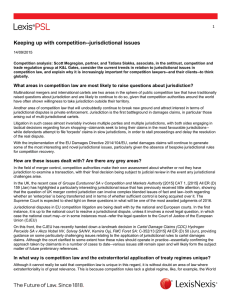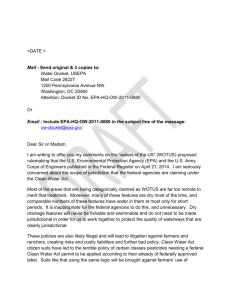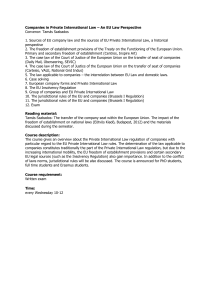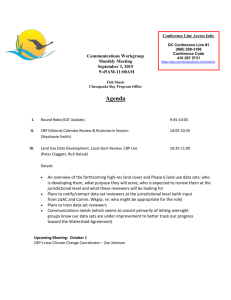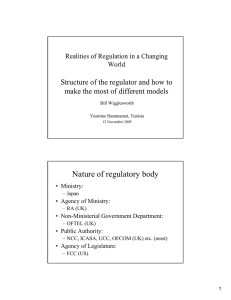“ Institutional Framework: Jurisdictional boundaries and roles of different agencies ”
advertisement
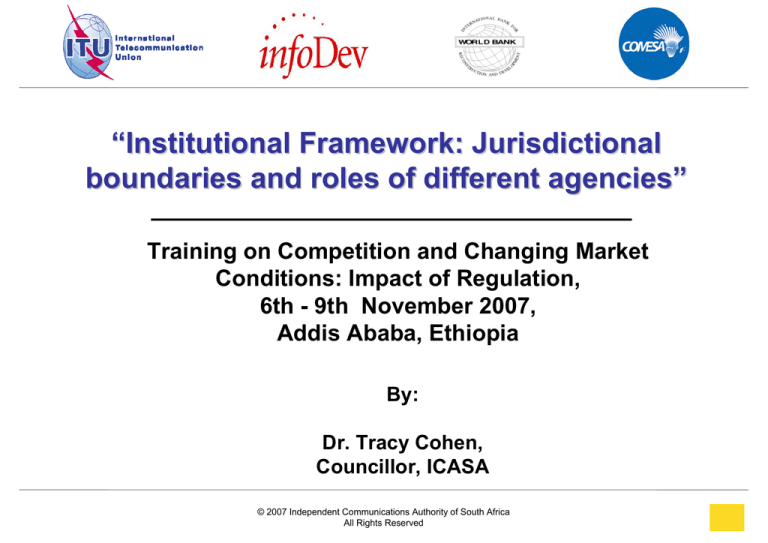
“Institutional Framework: Jurisdictional boundaries and roles of different agencies” Training on Competition and Changing Market Conditions: Impact of Regulation, 6th - 9th November 2007, Addis Ababa, Ethiopia By: Dr. Tracy Cohen, Councillor, ICASA © 2007 Independent Communications Authority of South Africa All Rights Reserved Disclaimer The views expressed in this presentation are not necessarily those of ICASA, its Council, management or staff. © 2007 Independent Communications Authority of South Africa All Rights Reserved 2 Overview Overview of the South African ICT sector Application of competition law principles in South Africa Role and responsibility of sector specific regulator and general competition authority Examples of jurisdictional co-operation/overlap Lessons for other countries revising regulatory frameworks © 2007 Independent Communications Authority of South Africa All Rights Reserved 3 Overview of South African Communications Sector Significant legislative reform for convergence – Vertical to horizontal, technology neutral, “unified” licensing framework Competition (ex post) and sector specific laws (ex ante) Monopoly legacy in fixed (despite new entrant) Duopoly legacy in mobile (despite third entrant) High, increasing market concentration & vertically integrated incumbent(s) Significant state shareholding in line with policy of “developmental state” Relatively high retail and wholesale prices “Cheapest” mobile broadband in the world (bandwidth and caps low) Current policy debates: Cost of doing business; undersea cable access, LLU; VANS © 2007 Independent Communications Authority of South Africa All Rights Reserved 4 Electronic Communications Act – Horizontal Licensing Communication Network Services Communication Services Broadcasting Services Radio Frequency Spectrum Individual Class Exempt 4 licensable activities or markets Licensed © 2007 Independent Communications Authority of South Africa All Rights Reserved Unlicensed 5 Overview 9 Overview of the South African ICT sector Application of competition law principles in South Africa Role and responsibility of sector specific regulator and general competition authority Examples of jurisdictional co-operation/overlap Lessons for other countries revising regulatory frameworks © 2007 Independent Communications Authority of South Africa All Rights Reserved 6 Policy or Market Failure? “Underlying most of regulatory economics is the existence of problems associated with lack of competitive entry. It is this which makes markets fail or succeed.” - Martin Cave, 2006 “The country's access deficit [the lack of broadband connectivity] was not due to market forces not working, but due to the fact that we have not had a working market. If there is one market that responds to market incentives, it is the telecoms market”. - David Lewis, Competition Tribunal, 2007 © 2007 Independent Communications Authority of South Africa All Rights Reserved 7 Leased line costs based on the OECD leased line basket at US$ PPP Telkom price reduction based on threat of SNO entry © 2007 Independent Communications Authority of South Africa All Rights Reserved 8 Competitiveness in SA © 2007 Independent Communications Authority of South Africa All Rights Reserved 9 Application of competition law principles in SA Competition policy is shaped by broader economic and political transformation (e.g. BEE and HDI quota for licenses) SA law and policy underpinned by pro-market principles: – Markets foster innovation – Markets are more efficient in allocating the right goods, for the right customers at the right price – Economic regulation to constrain market power of incumbents – Independent regulation 1996 Act limited in preventing or stopping anti-competitive conduct 2006 Act addresses this but application requires various detailed steps be taken first and requires significant financial and human resources to implement Important not to confuse policy and market failure © 2007 Independent Communications Authority of South Africa All Rights Reserved 10 Translated into law: Chapter 10 “Competition Matters” General enabling provision to direct an entity to cease or refrain from: – Any act likely to substantially prevent or lessen competition – Giving undue preference – Causing undue discrimination Prescribe regulations defining the relevant markets/market segments that pro-competitive conditions may be imposed, where licensees have SMP and where there is a finding of ineffective competition. Forbear from regulation where certain conditions are met © 2007 Independent Communications Authority of South Africa All Rights Reserved Prescribe by Regulation Due process Fair Administrative action Consultation Factual inquiry 11 Forbearance Law permits forbearance Draws on the Canadian Telecommunications Act Within “undue preference regulations”, the Authority may refrain from determining undue preference or conduct likely to substantially prevent or lessen competition, if: – – – refraining is consistent with the objects of the Act; the service or class or services is subject to sufficient competition to protect the interests of users; refraining will not impair the establishment or continuance of a competitive market. Above must all be determined, as a question of fact Unused to date and untested: unclear if the bar is too high? © 2007 Independent Communications Authority of South Africa All Rights Reserved 12 Market Definitions - Process Define and identify the retail or wholesale markets or market segments for pro-competitive measures where there is SMP and ineffective competition Set out the methodology for measuring effectiveness of competition – Complicated exercise in fact finding and regulation making Declare licensees with SMP in that market or market segment Set out the pro-competitive measures the Authority may impose as a remedy Provide for monitoring and investigation of anti-competitive behaviour in the market or market segment Schedule for periodic review of markets and market segments ation m r o f In © 2007 Independent Communications Authority of South Africa All Rights Reserved 13 Why define markets? Modeled on European approach To ensure regulation is appropriate, targeted and proportional To regulate only where there is market failure To understand the competitive dynamics of markets – How do different companies impact on each other? – In which market does this interaction take place? – To prevent companies from being able to behave independently from their competitors It is the initial step in competition analysis and provides the context in which to evaluate the level of competition and the impact of anti-competitive conduct in a given market © 2007 Independent Communications Authority of South Africa All Rights Reserved 14 What is Significant Market Power (SMP)? Dominance (defined in competition law) Control over essential facilities, OR Has a vertical relationship that the Authority determines could harm competition in the applicable market or market segments © 2007 Independent Communications Authority of South Africa All Rights Reserved 15 Status of SA market definition process Prioritised call termination market enquiry and leased lines Call termination is on average 52% of the retail rate Interconnection has increased over 500% since 1994 Calling Party Pays (“CPP”) gives terminating operators a monopoly over the provision of call termination to their subscribers and without price controls, terminating rates are set inefficiently high General inquiry and findings to be published Inquiry process has thus far taken about 1 year Law requires regulations (and consultation) © 2007 Independent Communications Authority of South Africa All Rights Reserved 16 Possible consequences Basic remedies for all operators (derived from law): • • • Obligation to interconnect Obligation not to discriminate Price transparency (e.g. publish tariffs) SMP players could be required to comply with: • • • Price controls Separate accounting requirements Obligations regarding recovery of costs and cost orientation © 2007 Independent Communications Authority of South Africa All Rights Reserved 17 Overview 9 Overview of the South African ICT sector 9 Application of competition law principles in South Africa Role and responsibility of sector specific regulator and general competition authority Examples of jurisdictional co-operation/overlap Lessons for other countries revising regulatory frameworks © 2007 Independent Communications Authority of South Africa All Rights Reserved 18 Sector specific vs. competition authority regulation Sector Specific Competition Authority Ex-ante Ex-post Multiple policy objectives Underlying principle: Pareto efficiency - no individual can be made better off without another individual being made worse off Focuses on a specific sector Economy-wide Focused on potential threat to competition Focused on actual threat to competition © 2007 Independent Communications Authority of South Africa All Rights Reserved 19 Roles and Responsibilities 1997 Competition Policy Guidelines identified concentrated market structures and associated anti-competitive practices as the key to underlying problems of competition in the economy Policy through sector specific laws 2000 – ICASA Act 2005 - Electronic Communications Act No. 36 of 2005 Competition Act No. 89 of 1998, as Chapter 10 specifies approach to amended competition policy – Competition Commission – Competition Tribunal – Competition Appeal Courts Manages concurrent jurisdiction with all SSR’s, in accordance with a memorandum of agreement Also provides for the relationship with competition authorities – Either authority may ask for and receive advice from the other on relevant proceedings © 2007 Independent Communications Authority of South Africa All Rights Reserved 20 Main Functions (in respect of competition) to prohibit anti-competitive agreements, practices or arrangements between firms to prevent abuse of dominance or monopoly position to regulate merger activity (approve or deny) – 1 telecom merger – prohibited – Telkom and BCX Economy wide to facilitate market entry into ICTs (and postal) through the issuing of licences and spectrum creation of a regulatory framework that promotes competition protect consumers and competitors Sector specific (and other noneconomic sectoral goals) © 2007 Independent Communications Authority of South Africa All Rights Reserved 21 Roles and Responsibilities Electronic Communications Act, 2005 Competition matters Ex ante Competition Act, 1998 (as amended) Memorandum of Agreement Mergers and acquisitions Ex post © 2007 Independent Communications Authority of South Africa All Rights Reserved 22 Overview 9 Overview of the South African ICT sector 9 Application of competition law principles in South Africa 9 Role and responsibility of sector specific regulator and general competition authority Examples of jurisdictional co-operation/overlap Lessons for other countries revising regulatory frameworks © 2007 Independent Communications Authority of South Africa All Rights Reserved 23 Jurisdictional Overlap The Competition Act explicitly creates concurrent jurisdiction with a sector regulator where both have legislative mandate to address anticompetitive conduct and requires a MOA MOA signed between ICASA and Commission in 2002: – Identifies and established procedures for the management of areas of concurrency; – Promotes co-operation – Provides for the exchange of information and the protection of confidential information Currently being revised Challenges of implementation Non-cooperation by parties Inappropriate lodging of cases with the Commission (e.g. interconnection charges) © 2007 Independent Communications Authority of South Africa All Rights Reserved 24 Challenges of jurisdictional overlap Act envisages both ex ante (markets) and ex post (cease and desists) regulation for ICASA Both require the promulgation of regulations as a condition precedent for regulating Section 67(9): “Subject to the provisions of this Act, the Competition Act applies to competition matters in the Electronic Communications Industry” ICASA must fulfil all the ex ante pre-requisites of the law to “oust” jurisdiction from the Commission As processes are medium to long term - concurrency is in tact Problem: Current wording presents opportunities for “forum shopping” and “legal gaming” by operators – ICASA not yet in a position to exercise full ambit of its powers – Wording suggests Commission does not possess jurisdiction © 2007 Independent Communications Authority of South Africa All Rights Reserved 25 Addressing jurisdictional overlap Institutional: Complicated by history of jurisdictional “grabbing” during recent reform process Operational: Different perspectives/mandates – different results Market: Exacerbated by monopoly legacy Legal: Situation needs clarification: Complementary Jurisdiction Policy: Different roles of the agencies requires clarification – Is the perception that ICASA and Commission carry out same/similar functions? – Is the market mature enough for ex post regulation by general competition authority? IS this desirable? – Does it have sufficient expertise? Capacity? Delivery? – Will this secure non-economic, redistributive policy goals? – What other models exist for co-operation and referral of matters? © 2007 Independent Communications Authority of South Africa All Rights Reserved 26 Jurisdictional Cooperation MOA being revised Commission participates in ICASA public processes ICASA participating in process to review Competition Act, including, concurrent jurisdiction Mweb vs. Telkom (2007) Margin squeeze Broadband service priced such that the retail service is below the wholesale price to ISPs Telkom disputes the jurisdiction of the Commission Court date set for April 2008 © 2007 Independent Communications Authority of South Africa All Rights Reserved 27 Overview 9 Overview of the South African ICT sector 9 Application of competition law principles in South Africa 9 Role and responsibility of sector specific regulator and general competition authority 9 Examples of jurisdictional co-operation/overlap Lessons for other countries revising regulatory frameworks © 2007 Independent Communications Authority of South Africa All Rights Reserved 28 Lessons for other countries revising regulatory frameworks EC has the framework directive to be implemented by NRA’s SA has had to define the framework for market studies – Complex combination of fact finding and regulation making – Resource intensive – Information asymmetries – Non-cooperation by operators Increase competition enforcement powers as simply as possible Onus on operators Ex ante vs. ex post Resolve any jurisdictional overlaps Funding and staffing concerns must be addressed Allow time for transition if requirements to implement are onerous © 2007 Independent Communications Authority of South Africa All Rights Reserved 29 Overview 9 Overview of the South African ICT sector 9 Application of competition law principles in South Africa 9 Role and responsibility of sector specific regulator and general competition authority 9 Examples of jurisdictional co-operation/overlap 9 Lessons for other countries revising regulatory frameworks 9 Questions and Answers © 2007 Independent Communications Authority of South Africa All Rights Reserved 30
